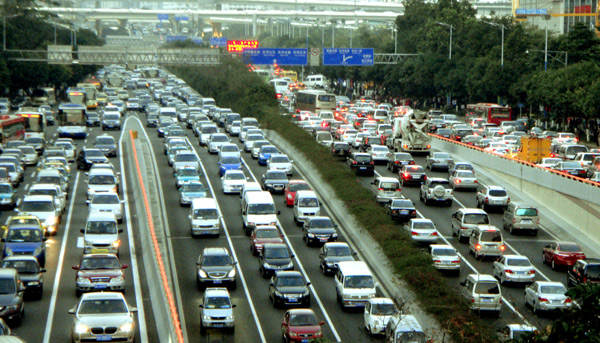
July 03, 2012 Reuters (Beijing) – Chinese auto stocks fell steeply on Monday after Guangzhou became China’s fourth city to put a cap on annual car sales to help ease worsening traffic gridlock.
Shares of SAIC Motor Corp (600104.SS) slumped 9.0 percent in morning trade, while Guangzhou Automobile (601238.SS) dropped 8.1 percent. FAW Car’s 000800.SZ shares were down 4.9 percent, while Changan Automobile 000625.SZ, a partner of Ford Motor Co (F.N) fell 2.5 percent.
SAIC has joint ventures with General Motors (GM.N) and Volkswagen AG (VOWG_p.DE), while Guangzhou Auto partners with Honda Motor (7267.T) and Toyota Motor (7203.T).
Over the weekend, the Guangzhou city government decided to only allow 120,000 new cars to be registered over a one-year trial period, or 10,000 cars a month, the official Xinhua news agency said.
The measure, effective Sunday, makes Guangzhou the fourth Chinese city, after Shanghai, Beijing and Guiyang, to limit car sales in an attempt to reduce traffic congestion and improve air quality.
Beijing started capping new car ownership at 20,000 a month in January last year to tackle the city’s chronic traffic gridlock. The move slowed the pace of traffic congestion, even though it still allows nearly a quarter of a million new cars each year, and was cited as a drag on China’s falling car sales.
China’s once red-hot car market is slowing under the weight of a cooling economy, among other factors. It is expected to grow by a single digit percentage figure in 2012 for a second year in a row, the slowest back-to-back growth since the sector took off in the late 1990s.

Guangzhou to issue car plates by auction, lottery Xinhua (Guangzhou) – South China’s metropolis Guangzhou announced a plan on Tuesday to allocate the city’s annual 120,000 new car registration quota through a dual model of auction or lottery. According to the initiative, half of the new car plates in the capital city of Guangdong province will be given out through auction, a method first introduced by Shanghai to control the car number on the street. The other 60,000 plates will be allocated through lottery, which has been utilized in Beijing since the beginning of last year to ease the capital… Read more »